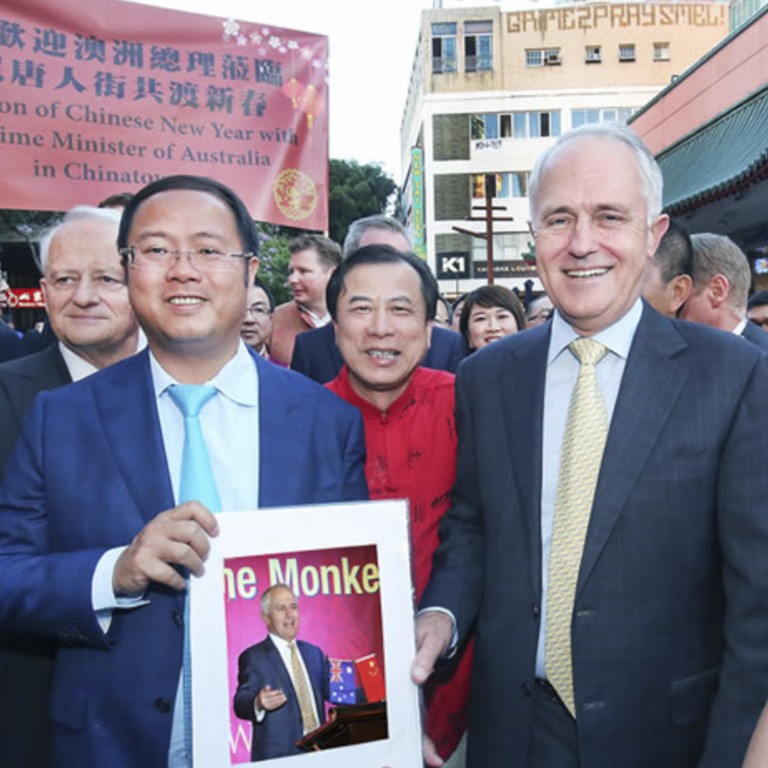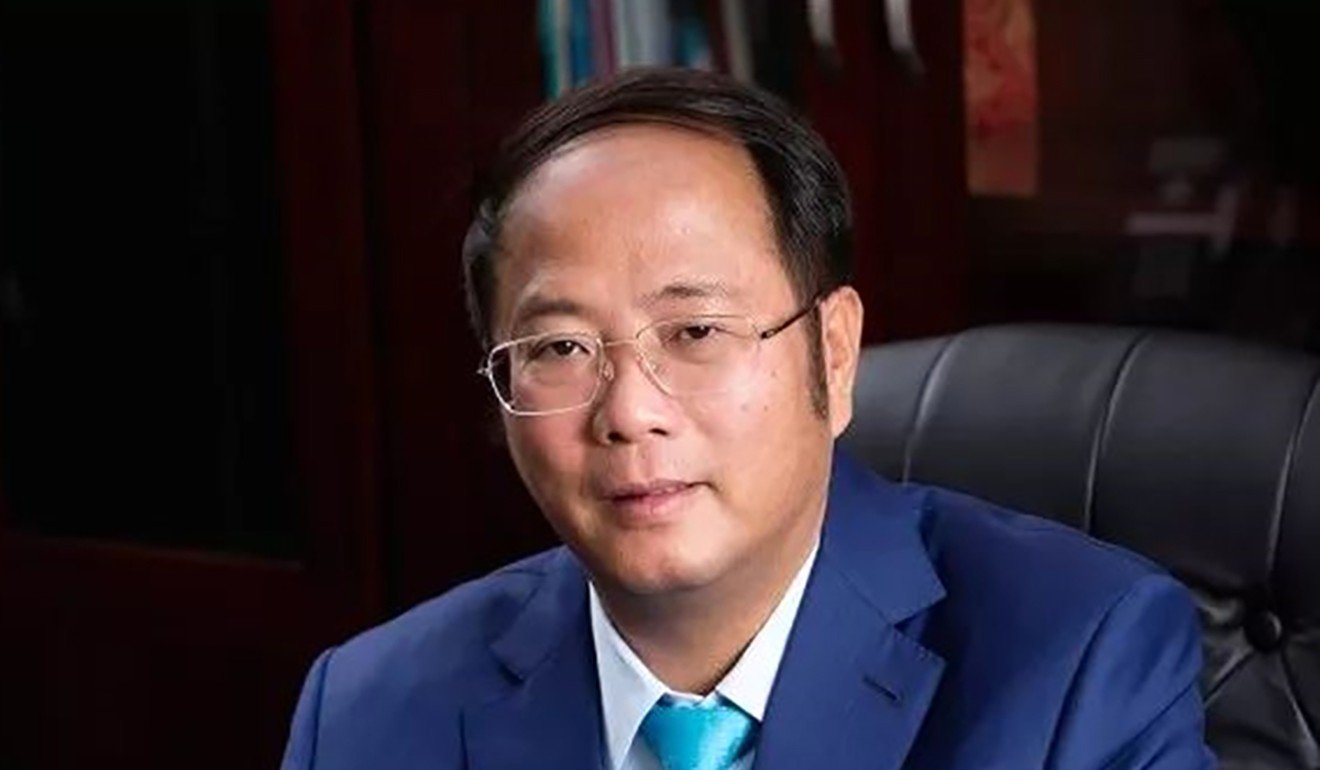
Clock ticks on Chinese billionaire Huang Xiangmo’s chance to appeal against Australian visa cancellation
- Political donor and businessman has 28 days to ask the authorities to reconsider invalidating his permanent residency
A high-profile Chinese political donor has less than a month to appeal against the reported cancellation of his Australian permanent residency, after his ties with China’s Communist Party sparked concerns about Beijing’s suspected influence in Australian politics.
Chinese billionaire property developer Huang Xiangmo has 28 days to ask the Australian Department of Home Affairs to consider restoring his visa, according to guidelines on department’s website.
He could also apply to the Administrative Appeals Tribunal for a review within nine days of receiving the notice to cancel his visa.
A department spokesman declined to comment on individual cases.
Huang’s fight to return to his multimillion-dollar Sydney mansion, where his wife and son live, comes after officials stripped him of his residency and denied his long-delayed application for Australian citizenship, The Sydney Morning Herald reported on Tuesday.
Analysts said his case reflected growing scrutiny by Canberra of Beijing’s suspected influence and “sharp power”in Australian politics.
Huang, chairman of property developer Yuhu Group Australia, was a prolific donor in Australia and headed several pro-Beijing organisations, prompting Australia’s national security agency to warn political party leaders about Huang’s links to Beijing as early as 2015.
After migrating to Australia in 2011, he cultivated close ties with major political and business leaders, notably former Labor senator Sam Dastyari.
Chinese billionaire Huang Xiangmo stripped of Australian residency, banned from returning over ‘political interference’ concerns
Dastyari was embroiled in a Chinese influence scandal in 2017 after reports that Huang’s company paid the former senator’s legal bills and Dastyari had warned Huang that his phone was tapped by government agencies. The politician also went against his own party’s position to defend Beijing’s policy in the South China Sea before Chinese-language media.
In The Daily Telegraph on Wednesday, Dastyari admitted he was successfully courted by Huang’s overtures, saying: “He had just booked out an entire restaurant to have dinner with me. I was vain. Arrogant. I thought I was special.”
Huang also donated A$1.8 million (US$1.3 million) to set up the Australia-China Relations Institute (Acri) think tank at the University of Technology Sydney, headed by former Australian foreign minister Bob Carr.
Huang stepped down as chairman of Acri in 2016, saying he was posing a distraction by drawing attention to “political donations and supposed Chinese influence”.

As one of Australia’s biggest political donors, Huang gave nearly A$2.7 million (US$1.9 million) over five years to the country’s two main political parties, the Australian Labor Party and the Liberal-National Coalition.
Huang was also pictured over the years with former prime ministers Malcolm Turnbull – who later called him an “agent of a foreign country” – as well as Kevin Rudd and Tony Abbott, with Abbott reportedly still courting Huang at Liberal fundraisers in 2017.
Huang has not commented on his reported residency cancellation, but is believed to be in Hong Kong, where he is understood to be a permanent resident.
‘Double agent’ Australian lawmaker Sam Dastyari quits over Chinese political links
Yuhu Group Australia said Huang “no longer holds any position at the company, is not involved in day-to-day operations, nor does he hold any shares. Regardless, the company’s operations and projects are certainly continuing and it is business as usual.”
According to the AAT’s public database, Huang has not filed an appeal. But Lauren Tanfield, assistant director of public affairs for the AAT, said not all information about matters before the tribunal were publicly accessible, since some cases may be subject to confidentiality orders or statutory confidentiality requirements.
Born in 1969, Huang is a native of Jieyang, a semi-rural township in southern China’s Guangdong province, according to a profile in state-run China Daily. He later received a history degree from the Sun Yat-sen University in Guangzhou.
In 2001, Huang raised money to start Shenzhen Yuhu Investment Development in southern China, and rose in prominence over the years to make Hurun’s 2010 list of China’s top philanthropists.
Huang was also listed as a member of the standing committee of Jieyang’s Chinese People’s Political Consultative Conference, a municipal political advisory body.
After migrating to Australia in 2011 for the “quality of life advantages and new investment opportunities”, he founded the Yuhu Group Australia in 2012, according to the company website.
While in Australia, Huang sought to promote greater political influence for overseas Chinese in Australia.
“There is still a long way to go for Chinese to be fully engaged in Australia’s politics,” he wrote in a 2016 opinion piece for state-run tabloid Global Times, calling criticisms of Chinese donations groundless and racist. “Anyhow, Chinese should be more confident and active in Australia’s political affairs, which includes confidently donating to local politicians.”
Australia draws line under anti-China hysteria. Will it be enough to unfreeze relations?
From 2014 to 2017, Huang was also president of the Australian Council for the Promotion of Peaceful Reunification of China, which advocates for the reunification of mainland China and Taiwan. The council’s website described him as having “extensive influence, appeal, and prestige” in political, business, and academic circles in Australia, making him “a model for overseas Chinese”.
China-watchers say the council has ties to the Communist Party’s United Front Work Department, which seeks to influence activities abroad through the Chinese diaspora and promote Beijing’s foreign policy objectives.
Huang was also selected in 2015 as the managing director of the 9th annual Overseas Chinese World Conference for Promoting Peaceful Reunification of China, of which Chinese State Councillor Yang Jiechi was the director, according to the Yuhu Group website.
The council, the Chinese embassy in Australia, and the Chinese foreign ministry did not respond to requests for comment.
In a 2015 post on the “new era of Chinese political participation”, Huang detailed ways for Chinese immigrants to better gain influence in democracies such as Australia.
“In a democratic society, politics is based on strength, from hard power such as votes (population) and banknotes (financial power), as well as soft power including language and political operations,” he wrote in the piece posted on the council’s website.
“Enhancing political enthusiasm and increasing participation in politics has always been the long-cherished wish of the Chinese community, and it is the only way to unite the strength of the Chinese community, enhance the status of the Chinese, promote Australia-China relations, participate in the formation of Australian public policies, and serve the country and society.”

